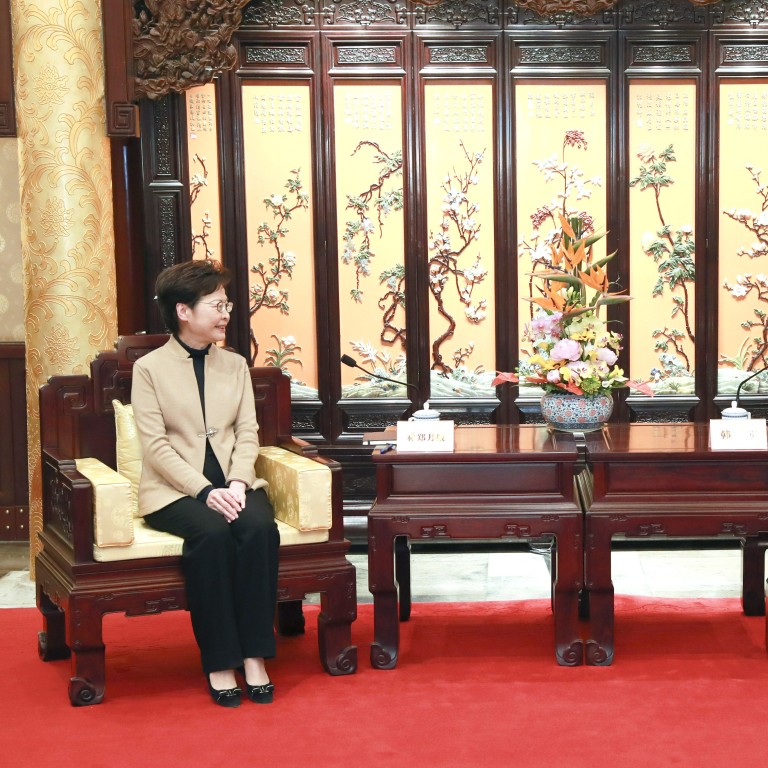
Hong Kong leader Carrie Lam will head to capital on Monday for annual duty visit, but trip ‘no sign’ of Beijing’s preference in chief executive race
- The final visit of her five-year term is expected to include face-to-face meetings with state leaders, though it is not known if President Xi Jinping will be among them
- The trip to the capital comes barely three months before a race for city leadership for which Lam has yet to announce her candidacy
Sources said as it would be the last duty visit of her five-year term, state leaders were expected to meet Lam in person to formally thank her for her work.
She has yet to say if she will seek a second five-year term, but will probably brief state leaders on the process and outcomes of Sunday’s election.
Insiders told the Post the trip was unrelated to the coming chief executive poll, and state leaders were not expected to give any indication as to Beijing’s preference in that contest.
“Please do not read anything into the meeting other than it being a duty visit,” a source said.
Lam’s visit will coincide with that of Ho Iat-seng, chief executive of Macau, which celebrates the 22nd anniversary of its return from Portuguese to Chinese rule on Monday. The two chief executives typically make their duty visits together.
A source said the government would make an official announcement about the trip on Monday morning. Lam will also attend a seminar hosted by the Our Hong Kong Foundation think tank at noon, and travel to Shenzhen later in the afternoon and fly to Beijing from there. She was expected to return to Hong Kong on Thursday.
Professor Song Sio-chong, of Shenzhen University’s Centre for Basic Laws of Hong Kong and Macau, said he believed Lam would highlight in her report card that she had helped to enforce the national security law, which Beijing imposed on the city in June last year.
“Lam has cooperated with the central government and worked with Beijing’s national security office in Hong Kong. The city’s police also set up a dedicated unit to deal with major national security cases,” Song said.
“She also helped Beijing to implement the overhaul to the electoral system, and the turnout in the functional constituencies and the Election Committee sector is acceptable. Even though the turnout in the geographical constituencies is low, that’s to be expected.”
He said he believed a third area that Lam would seek to highlight was how she maintained close communication with mainland Chinese officials, especially those in neighbouring Guangdong province, on the issue of the border reopening.
But Song said he also expected state leaders to tell Lam to continue to focus on areas such as housing and national education.
“In the past year, there was no breakthrough in Lam’s housing strategy, and the problem of subdivided flats has yet to be tackled,” he said. “Whether Lam seeks re-election or not, she must make preparations for the next term.”
Polytechnic University political scientist Chan Wai-keung agreed the national security law was likely to be a key point on Lam’s report card.
“But apart from that, there’s not much achievement that the chief executive can report about,” he said.
Chan added that state leaders would expect Lam to make the best use of the remaining six months of her term to prepare for long-shelved national security legislation under Article 23 of the Basic Law, the city’s mini-constituition.
Lau Siu-kai, vice-president of semi-official think tank the Chinese Association of Hong Kong and Macau Studies, said he expected Lam to highlight how the city’s administration was ready to take on Hong Kong’s deeply seated problems with the Legislative Council election over.
Earlier this month, the Post reported that while Lam was expected to meet top leaders in Beijing to report on her performance, the format of those meetings was uncertain and it was unclear if she would be sitting down with President Xi Jinping for the first time since 2019.
Since Hong Kong’s 1997 return to Chinese sovereignty, its chief executives have visited Beijing every December to brief the country’s leaders on the city’s political and economic development in the past year.
Last year, the trip was postponed because Hong Kong was battling a fourth wave of coronavirus infections, with new cases occasionally topping more than 100 a day.
Lam instead took part in a virtual meeting with Xi and Premier Li Keqiang on January 27.
Lam’s husband, Lam Siu-por, was also expected to travel with her this time, but pandemic considerations could put that plan on hold.
In 2016, Lam’s predecessor Leung Chun-ying travelled to Beijing with his wife, Regina Leung Tong Ching-yee, for the final duty visit of his five-year term.

